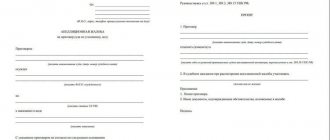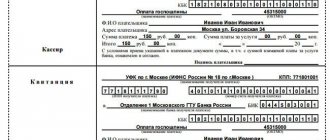The term “brief appeal” actually reflects not the purpose of the complaint, but its scope. Therefore, it would be more correct to use the term “preliminary appeal”, since it gives the correct definition of the complaint and reflects its purpose. Files in .DOC: Brief appeal formSample brief appeal
What is a short appeal?
The need to file a short or preliminary appeal arises due to the following conflict. The period for filing an appeal begins from the moment of announcement, and not from the moment the interested party receives a reasoned decision.
According to the law, persons who are present in the courtroom when the verdict or ruling is announced are not sent a full copy of the ruling. The court announces the effective part and has a legal 5 days to prepare a reasoned conclusion of the meeting.
In addition, in practice, in 60% of cases the court office does not have time to draw up a copy of a reasoned decision within the required five days. Thus, the opportunity for the parties to the process to draw up and file a full appeal within the time limits provided by law is closed.
Therefore, interested parties file a brief complaint with the higher court; after reading the full text of the district court’s conclusion, an addition or a full-fledged appeal is filed.
Motivation for the preliminary complaint
We have already said that motivating a preliminary complaint is impossible due to the lack of something that should be refuted, that is, the decision being appealed.
The information block in the structure of the complaint is retained, but it does not motivate the complaint itself, but the reason for writing the preliminary complaint. Therefore, we recommend that you include the following phrase in the text: “Due to the fact that as of November 11, 2021, a reasoned court decision has not been made, I reserve the right to file an additional appeal after reading the reasoned court decision.”
Such wording will secure your right to file an additional complaint. That is, in any case, the decision will already be considered appealed.
However, there is one thing to keep in mind.
Since a reasoned decision can be made at any time, you may find yourself in a situation where the judge sends the case to the appellate court with a preliminary appeal. That is, one way or another, the process of making the solution should still be monitored.
We recommend that, simultaneously with the preliminary complaint, you also write a statement addressed to the judge, in which you state a request to notify you of the possibility of familiarizing yourself with the reasoned decision.
How to write a short complaint
A brief appeal in a civil case actually starts the process of overturning the district court's decision, so the document is drawn up according to the established template. After receiving it, the court begins a new trial.
READ Filing an appeal against the decision of the court of first instance
Since the preliminary text of the direction is legally considered complete, the paper is drawn up taking into account the requirements of Art. 322 of the Code of Civil Procedure of the Russian Federation, the document indicates:
- The full name of the higher court that will hear the case.
- Applicant details (full name, registration, status in process).
- Details of the contested decision (date of consideration, name of the court, decision number).
- A short description of what the applicant disagrees with in the judge's findings.
- A summary paragraph with a demand to cancel (tighten, soften) the decision.
- Date of document preparation, signature.
Code of Civil Procedure of the Russian Federation Art. 330 provides a complete list of grounds for overturning a court decision and filing an appeal; if the applicant draws up the document independently, it is recommended to use the provision of law. Filing a short challenge allows you to fully prepare for the process.
An appeal in a criminal case must be submitted to a higher court within 10 days.
An appeal against a district court decision in an administrative case to the courts of general jurisdiction or an arbitration court, within 30 days.
Appointment of a preliminary complaint
As is clear from the name itself, a preliminary appeal precedes another procedural action - filing a reasoned appeal.
The current Civil Procedure Code does not contain any information about such a method of appealing a court decision. That is, we can say that the concept of a “preliminary” or “short” complaint does not exist in Russian jurisprudence.
At the same time, being completely unregulated, a preliminary complaint exists and is widely used.
There is no mystery in this and it is not a modern invention at all. The fact is that the Civil Procedure Code of all union republics, including the RSFSR, during the existence of the USSR regulated preliminary complaints, which means we can say that the existence of a preliminary complaint is an inheritance inherited from the USSR. Moreover, this practice still exists in every post-Soviet state, without being enshrined in law.
Both in Soviet times and now, the only purpose of a preliminary complaint is to fix the deadline for appeal in cases where the judge is late in writing a decision.
In the USSR, the concept of “resolution” did not exist, but it was allowed that the judge, leaving the deliberation room, announced only the operative part and made a reasoned decision within 3 days. Since the period for appealing decisions in civil cases in the USSR was 15 days, the parties were given the right to file a preliminary complaint if they were not given the opportunity to familiarize themselves with the full text of the decision within 3 days.
In the Code of Civil Procedure of the Russian Federation, art. 199 already legislatively regulates the right of the court to issue the operative part. At the same time, the same article gives the judge 5 days to write a reasoned decision.
That is, according to the law, a party to the case who wants to write an appeal can come to court on the sixth day, and she must be provided with a reasoned court decision for review.
But in reality, the party comes and is told “Come in the day after tomorrow,” then two more days later, etc. Naturally, a person has concerns that he will not see the decision until the period for appeal has expired. Moreover, going to court every two days is very difficult, especially for working people.
Thus, the only purpose of a preliminary appeal is to eliminate the risk of missing the deadline for appeal.
Where to file a short appeal
A preliminary appeal against a court decision is filed with the same authority that issued the contested decision. Attached to the document is a copy of the receipt for payment of the state fee and a notice that copies of the appeal have been sent to all participants in the process.
When submitting amendments to a higher authority, copies of documents are transferred to all interested parties. The supplement is accompanied by postal notices or receipts indicating that all participants in the process have been informed.
The state fee is paid once when sending a short dispute.
Reasoned additions are sent before the start of the trial on the merits. If the court makes a ruling not in favor of the applicant, the decision will enter into legal force immediately after its announcement. It will be possible to cancel the resolution only through the Constitutional Court of the Russian Federation.
State duty
Appeals against the actions of a judge in criminal cases sent to the appropriate authorities are filed without paying a state fee in the manner prescribed by the Code of Criminal Procedure of the Russian Federation.
Preliminary appeals to courts of general jurisdiction and colleagues of arbitration courts are submitted together with a receipt for payment of the state fee, which is:
- For individuals - 300 rubles.
- For legal entities - 2000 rubles.
When appealing an arbitration decision to the appellate instance, the state fee will be 50% of the amount of the state contribution, which is indicated when filing a non-property claim.
The law provides for a category of persons who are entitled to benefits when paying state fees when filing a challenge in certain types of courts:
- disabled people of categories 1 and 2;
- veterans of military service and combat.
Disabled people of groups 1 and 2 are exempt from paying the state contribution when filing a challenge in the courts of general jurisdiction, magistrates and the Supreme Court of the Russian Federation. The norm is regulated by clause 2 of part 2 of Article 333.36 of the Tax Code of the Russian Federation.
Veterans of military service and combat operations do not pay mandatory state duty if they appeal to the highest authority on issues of protection of their rights, which are outlined in the Law of the Russian Federation “On Veterans”.
In other property and non-property disputes that take place within the framework of administrative cases, the state fee established for filing a challenge is paid in full.
Depending on the type of administrative and civil case, the amount of the fee may vary. Each type of dispute is described in Art. 333.22 of the Tax Code of the Russian Federation and provides for a separate established amount when filing a challenge.
For example, if an appeal is filed by an employee regarding his illegal dismissal and the restoration of his right to work, the state contribution is not charged. A similar short appeal, but filed by the employer, is subject to a fee.
SAMPLE OF APPEAL AGAINST THE DECISION OF THE ARBITRATION COURT (2018-2019 APC)
An appeal against a decision of an arbitration court is drawn up according to the rules of the Arbitration Procedural Code of the Russian Federation and is sent through the court that adopted the appealed decision to the arbitration court of appeal, determined in accordance with Art. 33.1 of the Federal Constitutional Law No. 1-FKZ of April 28, 1995 “On Arbitration Courts in the Russian Federation.” In general, a sample appeal against a decision of an arbitration court is a prototype of the above template for a complaint against a decision of a court of general jurisdiction, with some exceptions. For example, in the completed arbitration appeal form, it is necessary to refer to the articles of the Arbitration Procedure Code of the Russian Federation, and a mandatory condition is to attach a copy of the appealed decision to it. It is important to present your comments as accurately and to the point as possible, without allowing an unreasonable increase in the text of the appeal. Arbitration judges will decide a case based on facts, not literary talent. When filling out the semantic part of the layout of an arbitration appeal against a decision to the court of appeal, ideally you need to make references to excerpts from the decision of the first instance court and identify as many contradictions and violations of substantive and procedural law in it as possible. To avoid committing procedural errors, we recommend that you download a sample 2021 appeal against an arbitration court decision in doc (Word)
via the following link:
Assistance in drawing up an arbitration appeal:
APPLICATION OF A STANDARD COMPLAINT AGAINST AN ARBITRATION COURT DECISION
To correctly draw up an appeal against a court decision of an arbitration court using the sample , you must:
1. Take into account the mandatory requirements for the content
of the complaint to the arbitration court of appeal and for the attached documents established by Art. 260 of the Arbitration Procedural Code of the Russian Federation, according to which an arbitration appeal must contain*:
- name of the arbitration court of appeal to which the complaint is filed
- name and address of the person filing the appeal, as well as all other participants in the trial
- name of the court whose decision is being appealed, number of the arbitration case, date of the decision, information about the subject of the dispute
- requirements to change and/or cancel the decision of the arbitration court in accordance with the powers of the arbitration court of appeal (Article 269 of the Arbitration Procedure Code of the Russian Federation) and the grounds on which the decision is appealed, with reference to the norms of laws and other regulatory legal acts, to the circumstances of the case and evidence, which are available in the case materials and/or new evidence
- justification for the impossibility of submitting (for independent reasons) additional evidence to the arbitration court of first instance, if the complaint contains references to additional (new) evidence
- a list of documents attached to the appeal, namely: - a copy of the appealed decision of the arbitration court - additional written evidence that could not be provided when considering the case by the arbitration court of first instance for reasons beyond the control of the appellant - petitions - receipts or payment orders for payment state duty or documents confirming the right to benefits for its payment - documents on sending or delivering to other participants in the process a copy of the complaint with attachments - a power of attorney or other document confirming the authority of the person who signed the complaint
* In the arbitration appeal, you can indicate telephone numbers, e-mails and other data and information that are necessary for the consideration of the case by the arbitration court of appeal, as well as submit petitions.
2. Completely and reasonably, with references to evidence and legal norms, state in an easy-to-read form your legal position, according to which the decision of the arbitration court of first instance is subject to cancellation or modification. An exhaustive list of grounds for canceling or changing an arbitration award is specified in Art. 270 of the Arbitration Procedure Code of the Russian Federation, according to which they are:
- incomplete clarification by the court of all circumstances that are important for the correct consideration of the arbitration case
- failure to prove circumstances erroneously established by the arbitration court that are important for resolving the case
- groundlessness of the conclusions set out in the decision, their inconsistency with the circumstances of the case
- incorrect application or violation by the court of substantive law, namely: - if the court did not apply the law that should have been applied - if the court applied the law that should not have been applied - if the court made an error based on an incorrect interpretation of the applicable rules of law
- incorrect application or violation by the court of procedural law, if this could lead or led to the arbitration court making an incorrect decision
The court's satisfaction of an appeal against a decision of the arbitration court depends on how thoroughly the analysis of the legal situation was carried out, how fully the errors of the arbitration court of first instance were identified and how correctly they were conveyed to the appellate court. To fully protect your interests in the arbitration court of appeal, we strongly recommend that you contact professional arbitration lawyers and attorneys to draw up an appeal.
To achieve the best result in an arbitration case, it is advisable to entrust the drafting of an appeal against the decision of the arbitration court to a professional arbitration lawyer. If necessary, our arbitration lawyer or lawyer will be able to remotely
study the documents and draw up an appeal that maximally protects the interests of your organization!
You have questions? Call!
+7
or order the preparation of an appeal by filling out the form:
SIZES OF STATE FEES FOR CONSIDERATION OF AN APPEAL
When filing
an appeal against a decision in a civil case: According to clause 9 of part 1 of Article 333.19 of the Tax Code of the Russian Federation, in cases considered by courts of general jurisdiction, magistrates, the state fee when filing an appeal is paid in the amount of 50 percent of the amount of the state fee payable when filing a claim of a non-property nature. Since, in accordance with clause 3 of part 1 of Article 333.19 of the Tax Code of the Russian Federation, when filing a claim of a non-property nature, the state duty is: for individuals - 300 rubles; for organizations - 6,000 rubles, then the state fee when filing an appeal is paid in the following amounts: for individuals - 150 rubles
;
for organizations – 3,000 rubles
.
When filing
an appeal against a decision of an arbitration court: According to clause 12 of part 1 of Article 333.21 of the Tax Code of the Russian Federation, when filing an appeal against a decision of an arbitration court, the state fee is 50 percent of the amount of the state fee payable when filing a claim of a non-property nature. Since, in accordance with clause 4 of part 1 of Article 333.21 of the Tax Code of the Russian Federation, when filing a claim of a non-property nature, the amount of the state duty is 6,000 rubles, then the state duty when filing an appeal against the decision of the arbitration court is paid in the amount of 3,000 rubles
.
Details for paying the state fee when filing an appeal against a court decision must be clarified on the website of the court to which it is addressed.
RULES FOR DIRECTION OF APPEAL COMPLAINTS TO COURT
an appeal to the court of general jurisdiction (in a civil case) or against a decision of an arbitration court, it is necessary to send or hand over to other persons participating in the case copies of the appeal and the documents attached to it. At the same time, with regard to filing an appeal against a decision of the arbitration court, Part 3 of Article 260 of the Arbitration Procedure Code of the Russian Federation provides for a mandatory rule on sending documents to other participants in the process by registered mail with notification of delivery or delivery of documents to their representatives in person against signature. The appeal must be accompanied by documents confirming the direction or delivery of the above documents to other persons participating in the case. Appeals filed both to the court of appeal of general jurisdiction and to the arbitration court of appeal are filed through the court that made the decision. What does it mean? This means that appeals must be filed through the office of the court that made the appealed decision, or by sending it by mail to the address of the court of first instance. In the second option, the date of filing the complaint will be considered the date of the postmark on acceptance of the postal item by the post office. Also, appeals can be filed by filling out a form posted on the official website of the court on the Internet.
HOW MUCH DOES IT COST TO FILE AN APPEAL AGAINST A COURT DECISION?
| Trial lawyer/advocate service | Price * |
| Drawing up an appeal against a court decision | from 5,000 rub. |
* The cost of drawing up an appeal depends on the complexity of the dispute and the number of documents that need to be studied and analyzed.








